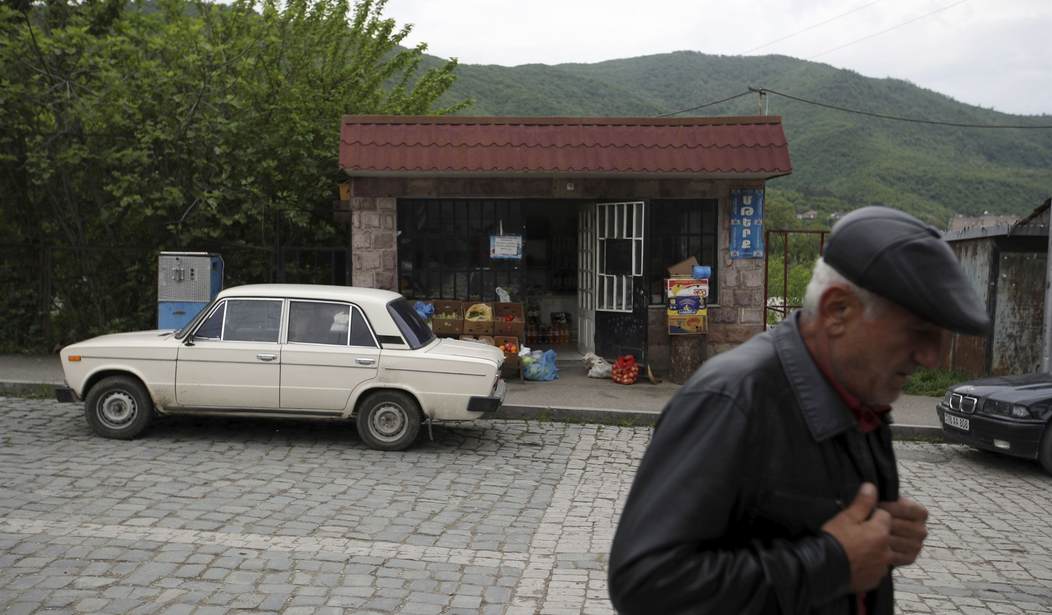Armenia presents a paradox. On the one hand, it has suspended its membership in the Russian-led Collective Security Treaty Organization (CSTO) and even threatened to withdraw completely. In addition, Prime Minister Pashinyan has proclaimed his country’s desire to turn to the West and is now discussing membership in the EU. Yet, on the other hand, Armenia has greatly enabled Russian sanctions evasion with impunity and aligns with Iran’s agenda. We can explain this paradox by invoking Yerevan’s bitter disappointment with Russia’s failure to defend it in its wars against Azerbaijan since 2020. Since Russia has historically defended Armenia against Turkey and now Azerbaijan and has a military base at Gyumri, there is a permanent expectation of support that Moscow has repeatedly dashed since 2020.
This hope of Russian support also stems from Armenia’s landlocked geographical position. Armenia’s location prevents ready access to maritime trade routes. Yerevan’s hostility to Azerbaijan, which also generated a Turkish blockade, led Baku and Ankara to exclude it from international trade and transportation routes. Therefore, it has had to depend on Moscow’s economic and military-political support and rail and maritime routes via Russia and Georgia. However, as many reports have stated, collusion with Moscow to evade sanctions is incompatible with membership in the EU or genuine association with the West. Thus, Armenia has fallen into the trap of excessive economic dependence on Russia even while threatening to leave its orbit. The dimensions of this trap are immediately evident in Armenian trade and economic statistics.
For example, in 2022, Armenia's exports to Russia tripled - from $0.794 billion to $2.37 billion. In 2022-2023, trade with Russia doubled. This factor and infusions of Russian cash help explain why Armenia’s economy grew by 12%. This growth manifested in a surge of exports, masking that Russian buyers -individuals, government, and companies - purchased goods through Armenian intermediaries and re-exported them to Russia. As a result, Armenia’s trade with Russia is double that of its trade with the EU. In the first nine months of 2023, the export of goods from Armenia to Russia increased by 85%, of which 80% is re-export. For example, in 2023, the trade turnover with Russia increased to over 7 billion dollars. The UAE is Armenia’s second-largest trade partner, also owing to re-exporting to Russia.
Recommended
According to New Eastern Europe, Yerevan also helped Moscow evade sanctions by facilitating the transit of Iranian drones and missiles. Operational data reveals flights from Yerevan's Zvartnots International Airport, where Soviet-eraIlyushin-76MD heavy cargo aircraft allegedly transported Iranian drones to Russia. Observers also report that the sanctioned Iran Air Cargo operated flights through Zvartnots to and from Moscow, along with other Iranian entities implicated in delivering Iranian drones to Russia via Armenian airports.
The question arises as to whether Armenia has successfully conducted this sanctions evasion with impunity. This impunity may be addressed in the EU’s recent 13th package of sanctions against Russia. Although previous sanctions targeted Russia’s foreign revenues, access to military technologies, and supply chains, this package focuses on enforcement, particularly against third countries’ circumvention of EU sanctions, yet it omitted Armenia. Likewise, Washington, which recently issued updated sanction lists against Russia, including approximately 600 people and entities from 11 countries that “facilitate evasion of sanctions against Russia,” did not cite Armenia.
Furthermore, Armenia also appears to be colluding with Iran. Armenia functions as a transit point in Iran’s air corridor route to Syria and Lebanon. Allegedly, Iran exploits Armenia to facilitate Iran’s delivery of military equipment to Syria and Lebanon. Concurrently, Iran supports Armenia against Azerbaijan, while “Iran is acting against Azerbaijan on multiple fronts, with the IRGC’s Quds Force conducting operations in asymmetric warfare, information warfare, and transferring weapons and military equipment to Armenia.”
This economic dependence on circumventing sanctions and support for Iran piles up obstacles for the West to welcome Armenia into its midst and its departure from dependence upon Russia. Western officials and reports have commented on Armenian entities' presence in sanctions evasion processes. In March 2023, the US designated Armenia as a country engaged in smuggling activities to Russia. A recent EU sanctions package aimed at stopping third-country circumvention also identifies Armenian entities as among the offenders.
Armenia’s dissatisfaction with Moscow provides the West with great opportunities for regaining influence in the Caucasus and helping to broker an end to the Nagorno-Karabakh conflict. Two conditions must be met. One is that the West act more cohesively and vigorously to broker that peace and welcome all three Caucasian states back to a vibrant integration process. But for that to happen, it will not be enough for Armenia to withdraw from the CSTO and request the withdrawal of Russian troops. If it continues its economic dependence upon circumventing sanctions upon Russia in the absence of a formal peace treaty with Azerbaijan, those requests and withdrawal will be difficult to meet. In fact, they may provide the basis for a future Russian intervention there against the Pashinyan government. For Washington and Brussels to reach out decisively to Yerevan, the condition should be that Armenia curtail the circumvention of sanctions. If it cannot free itself from Russia’s bear hug, Yerevan and the West will have lost another opportunity to bring peace to Armenia and its troubled neighborhood.

























Join the conversation as a VIP Member